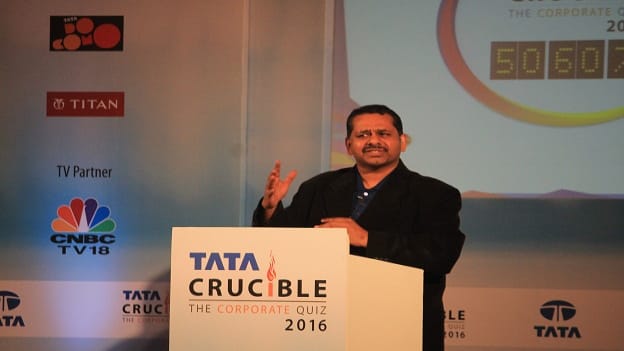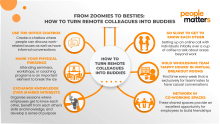Giri ‘Pickbrain’ Balasubramaniam on quizzing & TATA Crucible

The TATA Crucible Corporate Quiz is one of India’s largest and most widely telecast business quizzes. It draws participants from diverse companies and sectors. Atul Agarwal, Vice President – TATA Sons notes that “The main objective of Tata Crucible Corporate Quiz is to bring together bright minds from across the country on a common and challenging knowledge platform, promoting out-of-the-box and innovative thinking”. In this interview, we talk to Giri Balasubramaniam, the quiz master for the show about the quizzing in India, talent trends and the opportunities available for employees and companies.
Q. If you had to give an elevator pitch to a business leader about TATA Crucible, what would it be?
Every business leader wants to see some form of continuous learning trajectory in their employees. And TATA Crucible is a competition that helps employees stay in touch with what’s happening in the real world. Most people tend to go through their career with what they have learned in their college. This approach is becoming redundant far faster than a decade ago. In today’s world, people want more ways to learn and engage, beyond books, lectures, and seminars. Engagement platforms like a quiz enable learning even if the participants don’t end up winning.
A competition like TATA Crucible brings together companies who are progressive minded and serious, so it is also a platform for networking opportunities. If you look at the structure of the quiz along with breaks - it is a common sight to see participants exchanging cards and meeting over coffee breaks.
Q. What have been some key changes in the quizzing landscape in the last few decades?
Earlier, success in quizzing was directly proportional to the amount of time one spent in the library. But today, technology has democratized information. A lot of new information is also now easily available. Anyone previously winning a quiz in Visakhapatnam (Vizag) would not be known nationally. Today, teams from Raipur and Vizag are able to compete with teams from Mumbai or Delhi. So, technology has made it more inclusive.
Quiz shows have also become similar to a T20 match or a twitter-like condensed format. It is no longer 4 -5 hours long. The prelims could take 45 minutes and the finals could take half an hour. A lot of this has to do with TV coming into play. So, if you analogize it to cricket, there will be a set of people who will watch t20 and say that amazing cricket shots came into existence because t20 came into existence. Then there are those who would rather watch a test match.
In terms of innovation, it is no longer about just the questions and answers – it is also about being able to work out an answer. I’m one of those people who is extremely open to other forms or mediums entering any zone of play. Which is extremely important and one has to learn to adapt. This is similar to the world of business, where brands have to change themselves over a one-year spectrum.
As a quizmaster, the problem that technology has created is that the shelf life of a question is now down to one show. If I had a quiz yesterday, today there is a link with the questions on Facebook.
It is no longer about just the questions and answers – it is also about being able to work out an answer
Q. Are there any talent related trends that stand out according to you?
In terms of cities, smaller cities do extremely well. Vishakapatman, Ranchi, and Jamshedpur are a few examples. There could be two reasons for this. One – there aren’t many national level events. So when something like this comes up, they take it very seriously. Perhaps it also has to do with the fact that there are fewer distractions when compared to the bigger cities.
Surprisingly, the most consistently competing company is the Reserve Bank of India. In our country, we tend to take the performance of public sector companies with a pinch of salt. But in a competition like TATA Crucible, their performance completely contradicts that. In every TATA Crucible, you will find a large number of public sector enterprises taking part and qualifying for the final. Recently, we had the government of Uttar Pradesh, Indian Railways, and the Armed Forces qualify for the final.
Q. What is the role that such competitions play in the career graph of an employee?
As far as recruitment is concerned, candidates have used their participation to pitch for a better job or for a higher education course. People who engage in any cerebral activity, not just TATA Crucible have a huge talent advantage. That’s because you’re just taken a little more seriously.
And companies want people who are in touch with the market. There have been companies that have put out their own advertisements celebrating the victory of their employees. Some companies that have done really well have started to conduct quizzes in their own company. So it has created a culture of quizzing and self-learning.
The problem that technology has created is that the shelf life of a question is now down to one show
Q. What is your advice for someone preparing for a competition like TATA Crucible?
Honestly, I don’t think one can prepare for a quiz anymore just because of the vastness of information. As a quizzing company, we operate with a team of 30 people who are researching. So, if you are a team at TATA Crucible that means the ratio is 2:30 people.
In terms of advice, well, when you look at things in your normal daily life – say when you’re reading a newspaper or a magazine, you need to absorb those few things that are of value and has the chance of becoming a question. Here’s an example: When you read a news item about Dr. Raghuram Rajan getting replaced by Urjit Patel, a good quizzer would look up to see if there are any books Mr. Patel has written because that’s likely to be a question. So, it is the things that go beyond a headline that gets you prepared for a quiz like this.
From our end, as a research company, we take into account the work pressure and the lack of time that employees are faced with. The whole point of a quiz is to get the answer out of a contestant. It is clearly not a platform for the quiz master to display his or her intellect. So, I’m good with the thumb rule that out of the ten questions that we ask, eight can be answered. In order to factor this, we grade our questions. We work around a formula, where, say four could be graded as questions the contestant “should be knowing”, another four could fall into the category of “did you know this”. The last two questions could revolve around “let me see whether you know this”. We also run the questions past a team. So we know what’s in the zone of comfort. The second way of doing this is to keep the questions contemporary.










